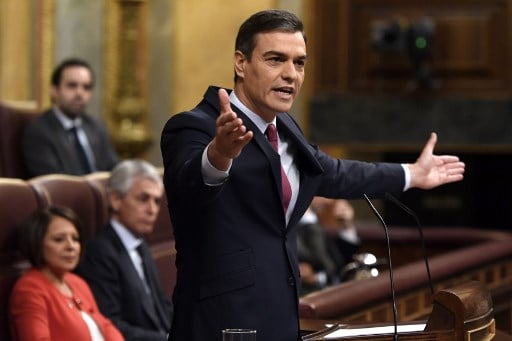The narrow victory paves the way for the country's first-ever coalition government since its
return to democracy in the 1970s.
Sanchez, who has stayed on as a caretaker premier since inconclusive elections last year, won 167 votes in the 350-seat assembly compared to 165 against, with a decisive 18 abstentions by Catalan and Basque separatist
lawmakers.
He plans to form a minority coalition government with hard-left party Podemos this time around, in what would be the first coalition government in Spain since the country returned to democracy following the death of longtime
dictator Francisco Franco in 1975.
Podemos' pony-tailed leader Pablo Iglesias broke into tears after the results of the vote were announced and his lawmakers chanted the party's slogan “Yes we can!”.
“A period of moderation, progress and hope opens up today,” Sanchez tweeted shortly after the vote.
Con el Gobierno de la Coalición Progresista, España abre un tiempo para reivindicar el diálogo y la política útil. Un Gobierno para todas y todos que amplíe derechos, restaure la convivencia y defienda la justicia social.
Hoy nace un tiempo de moderación, progreso y esperanza. pic.twitter.com/kDdDvTZTQr
— Pedro Sánchez (@sanchezcastejon) January 7, 2020
Sanchez, who plans to form an unprecedented minority coalition government with far-left party Podemos, got 167 votes in the 350-seat parliament, with 165 votes against and 18 abstentions.
This is how he secured his majority in the second round vote.
Pedro Sánchez acaba de lograr la #Investidura
A favor: 167
– PSOE 120
– Podemos 35
– PNV 6
– +País 2
– NC 1
– Compromís 1
– Teruel Existe 1
– BNG 1En contra: 165
– PP 88
– Vox 52
– C's 10
– JxCAT 8
– CUP 2
– UPN 2
– Foro 1
– CC 1
– PRC 1Abstención: 18
– ERC 13
– Bildu 5— MALDITO DATO (@MalditoDato) January 7, 2020
He lost a first confidence vote Sunday having failed to win backing from an absolute majority in the 350-seat parliament.
For Tuesday's second vote he needed just a simple majority to remain prime minister.
The Socialists struck a deal last week with the 13 lawmakers from Catalan separatist party ERC to abstain, but the numbers still looked tight.
Sanchez, 47, won by just two votes after the sole lawmaker from the regional Coalicion Canaria formation broke ranks at the weekend to say she would vote against him instead of abstaining.
Spain, the eurozone's fourth-largest economy, has been in political gridlock for most of the past year after two inconclusive elections in April and November.
Sanchez's Socialists won a repeat November 10th poll but were weakened, taking 120 seats — three fewer than in April — in an election which saw upstart far-right party Vox surge to third place.
Sanchez quickly struck a deal with Podemos to form what would be the first post-dictatorship coalition government in Spain, despite having previously said that a coalition with the far-left would keep him up at night.
'Progressive coalition'
The two parties are pledging to lift the minimum wage, raise taxes on high earners and big business, and repeal elements of controversial 2012 labour market reforms that made it easier to fire workers — measures which have alarmed business leaders who warn they will hurt job creation.
With the two formations' combined total of 155 seats still falling short of a majority, Sanchez had also secured the support or abstention of several smaller regional parties including the ERC which saw him squeak by in the second confidence vote.
As part of the ERC deal, Sanchez has agreed that the national government should hold talks with Catalonia's separatist regional administration to resolve the “political conflict”.
Catalonia remains in flux following a 2017 independence referendum which Madrid declared unconstitutional.
“There is no other possible option” to a Socialist-Podemos government, Sanchez told parliament Tuesday ahead of the vote.
“Between this progressive coalition and the continuation of political deadlock, I hope the majority of the chamber picks the progressive coalition.”

'Most radical'
Spain's centre-right parties and Vox accused Sanchez of putting national unity at risk with his pact with the Catalan separatists.
“This government against Spain is the most radical of our history,” said the leader of the main opposition Popular Party (PP), Pablo Casado.
He also accused Sanchez of forming a “Frankenstein government” made up of “communists” and “separatists” who “want to put an end to Spain”, and warned that his coalition would be unable to govern and not last the full four years.
Applause for Aina Vedal
Sanchez's tight margin for victory led Podemos lawmaker Aina Vidal, who is in severe pain with cancer and had to miss the weekend vote, to turn up for Tuesday's crucial vote despite her illness.
Her fellow lawmakers gave her a standing ovation when the session began.
DIRECTO | Pablo Iglesias comienza su intervención agradeciendo a Aina Vidal, diputada de En Comú Podem enferma de cáncer, su presencia en el hemiciclo. Una fuerte ovación de la cámara. #investidura https://t.co/iXJLn1fFVG pic.twitter.com/q8YIfOVptl
— EL PAÍS (@el_pais) January 7, 2020
Sanchez came to power in June 2018 after ousting his PP predecessor Mariano Rajoy in a no-confidence vote, but he was forced to call elections in April after Catalan separatists refused to back his budget.
“The political landscape remains tricky,” ING analyst Steven Trypsteen said.
“The new government would be a minority government, the Catalan tensions could flare up again… and the fiscal situation makes it difficult to increase spending a lot,” he added.




 Please whitelist us to continue reading.
Please whitelist us to continue reading.
Member comments